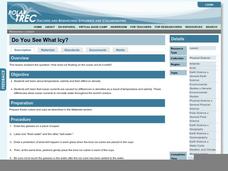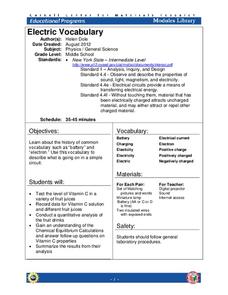Curated OER
Mind-Blowing Glass
Learners explore and study the life and art of internationally know glass sculptor, Dale Chihuly. They recognize organic forms in her massive body of blown-glass work and create an organic sculpture of their own utilizing her style of...
PBS
Women's History: Glass Windows; Glass Ceilings
Discover stories about women's history in beautiful stained glass windows. The second in a three-part series teaches scholars about a famous artistic style of stained glass windows and the influential women that used art to impact...
Curated OER
How do they make glass into different shapes?
Students investigate the process of glass blowing.In this simulation of glass blowing experiments students experiment how glass is formed and why not all glass is the same.
Curated OER
Swirling, Twirling, Glistening Jewels... Glass Art In Words
Students examine the art form of the glass sculpture. After viewing a three dimensional object, they write creatively describing the object through the use of metaphors. They use peer editing to check for grammatical and spelling errors.
California Academy of Science
What's on a Penny?
As a lesson on scientific observation, have your class investigate the features of a penny and a nickel. Working in pairs, they practice writing detailed descriptions using their senses and a ruler to gather information. This is an...
Curated OER
The Stained Glass Window
Young scholars use centimeter rulers and the attached worksheet containing a scale drawing of a stained glass window. The actual measurements of the stained glass window are given, and students are asked to find the actual measurement of...
Curated OER
Electricity - How it Works and How We Measure and Pay For It
Students investigate energy consumption by researching wattage. In this electricity lesson, students discuss how electricity works and gets transferred to our electronic devices through generators and circuits. Students examine their...
Virginia Department of Education
Graphing Linear Equations
Combine linear equations and a little creativity to produce a work of art. Math scholars create a design as they graph a list of linear equations. Their project results in a stained glass window pattern that they color.
Curated OER
Dale Chihuly
Students examine the characteristics and makeup of glass. In groups, they research the life and work of Dale Chihuly and how he used glass to create his artwork. They answer discussion questions on different pieces of art and share their...
Curated OER
How Does a Thermometer Work?
Students explore how a thermometer works. In this temperature instructional activity, students use a glass bottle, a straw, and food coloring to construct a homemade thermometer. Students record observations.
Curated OER
Working in Space
Learners design and build one of three engineering problems dealing with living and working in space.
Curated OER
Glass Blowing How Do They Make Glass Into Different Shapes?
Students experiment with butter as a supercooled liquid in order to better explain how glass is made into different shapes.
Curated OER
Hot Air Balloons
Students examine how a hot air balloon works. In this hot air balloon lesson, students do an experiment to test the effects of heat on density. Students make their own hot air balloon and act out how nitrogen moves when turned to a liquid.
Curated OER
What Can We Learn From the Past?
What would future archeologists learn from your scholars' personal belongings? Have them bring in a box of "primary sources" from their home. Discuss the difference between observations and inference, using some of your own items to...
101 Questions
Meatballs
Your classroom will overflow with learning as they analyze the volume in a pot of meatballs. Young mathematicians predict the number of meatballs that will make a pot of sauce overflow. They incorporate both the volume of cylinders and...
Curated OER
Density of Glass Fragments
Students explore how the density of an object is determined and determine what a "physical property" is. They demonstrate how science can be applied to police work.
Polar Trec
Do You See What Icy?
Here is a lesson that kicks off with a question. "How does ice floating on the ocean act as it melts?" As learners investigate this natural phenomenon, they'll discover that it has a lot to do with temperature, salinity, and the effect...
Curated OER
Close Observation: Coins
Integrate math, science, and speaking/listening with a collaborative hands-on activity. Each group works with a single penny, examining it with the naked eye and recording observations. Repeat using magnifying glasses. Then repeat with a...
Cornell University
Electric Vocabulary
Practice electric vocabulary using multiple methods. Learners begin by watching a video that explains vocabulary related to electric currents. They match vocabulary cards to practice and then create an electric circuit. Using the...
Curated OER
# 02 The Aspirin Shelf-Life Scenario
Young scholars work for a company that produces acetylaslicylic acid, aspirin. They have been assigned the task of determining if different packaging materials and/or environmental storage procedures can increase the shelf-life of the...
California Academy of Science
Notice and Wonder
Pint-sized zoologists practice the art of observation. They take notes, pictures or written, as they observe an animal for a period of time. This can be done at the zoo, with a visiting classroom animal, or perhaps at the humane society....
Mathematics Assessment Project
Calculating Volumes of Compound Objects
After determining the volume of various drinking glasses , class members evaluate sample responses to the same task to identify errors in reasoning.
Big Kid Science
Create a Milk Carton Camera to Observe the Eclipse!
Step aside, fancy glasses... it's time to create a solar eclipse viewing camera of your own using nothing more than a milk carton.
NASA
Cleaning Water
Give young scientists a new appreciation of fresh, clean drinking water. After learning about the ways astronauts recycle their air and water, your class will work in small groups creating and testing their very own water filtration...

























